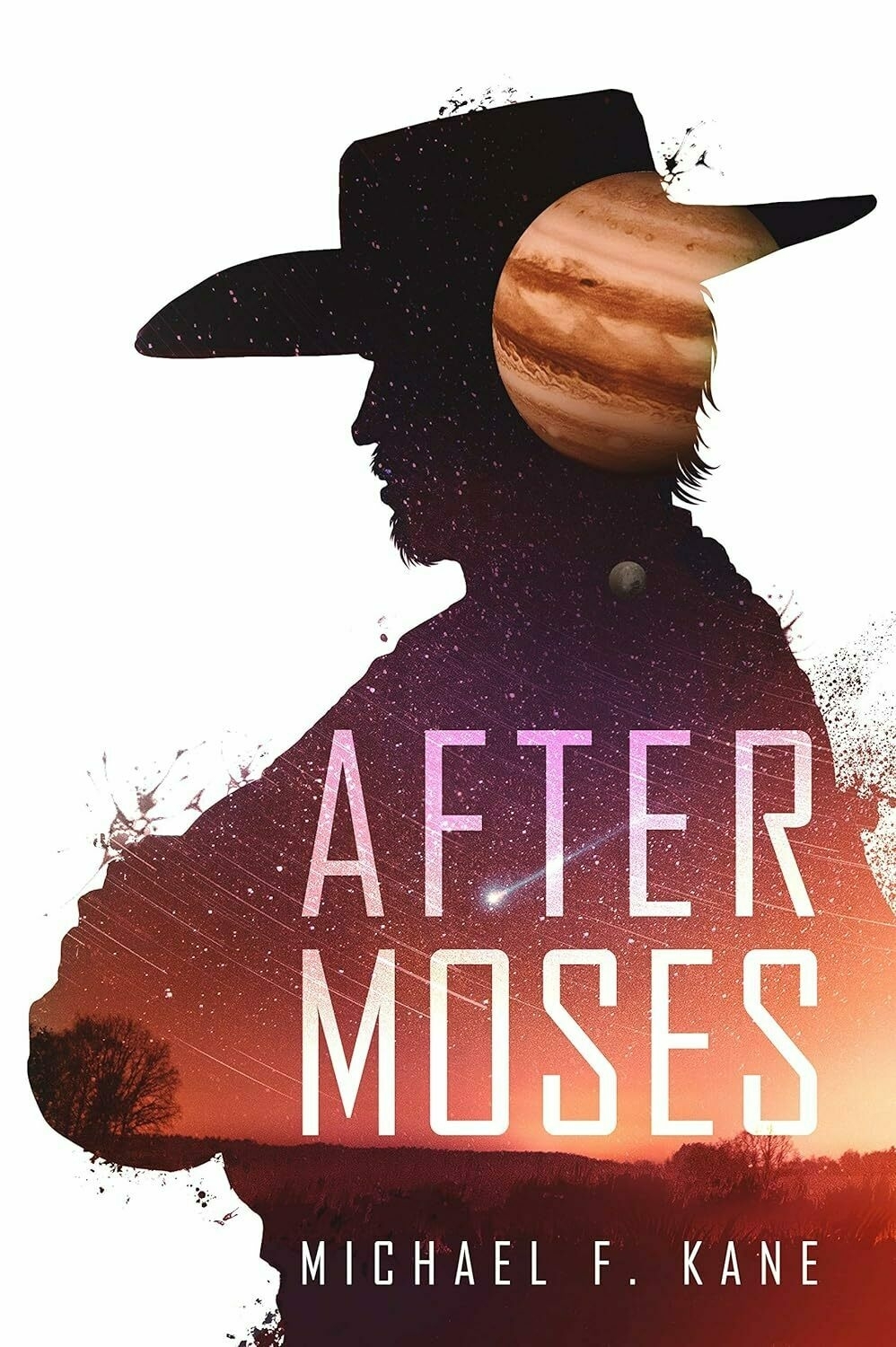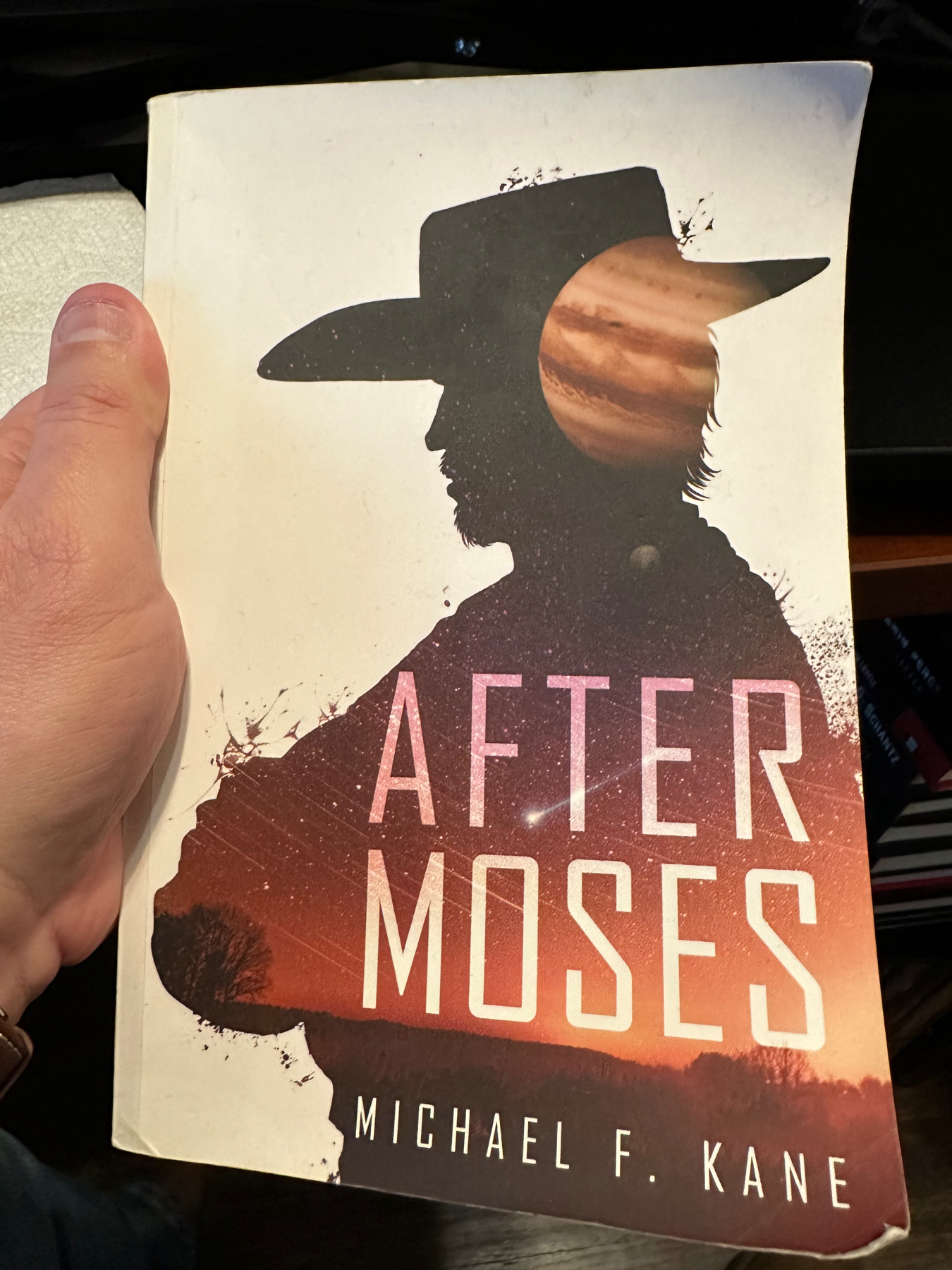Retrophisch Review: After Moses
 My Twitter pal Trevor has done some great writing on how the Western archetype has been so successful since it’s introduction on the silver screen a century ago. One reason for the success of The Mandalorian is it is essentially a Western set in the Star Wars universe. So too, is Firefly nothing more than a space western, something which no doubt aided its success (with viewers, at any rate, the studio not so much). So when Trevor made note of Michael F. Kane’s, novel After Moses this past September, I purchased the Kindle version because it sounded intriguing, and though my reading queue is already too deep to add more to, I nevertheless did so. With no regrets.
My Twitter pal Trevor has done some great writing on how the Western archetype has been so successful since it’s introduction on the silver screen a century ago. One reason for the success of The Mandalorian is it is essentially a Western set in the Star Wars universe. So too, is Firefly nothing more than a space western, something which no doubt aided its success (with viewers, at any rate, the studio not so much). So when Trevor made note of Michael F. Kane’s, novel After Moses this past September, I purchased the Kindle version because it sounded intriguing, and though my reading queue is already too deep to add more to, I nevertheless did so. With no regrets.
I was so smitten with the first two chapters that I managed to find a slightly used paperback version, and do not regret that, either. For me, there’s something about the printed page, and especially of science fiction novels, since print was all we had back when Michael and I were coming of age. And paperback—though what I read would be referred to today as “mass market” paperbacks while After Moses is more trade sized—were what all the sci-fi greats I first read in the early ’80s were available in.
Matthew Cole is from the Arizona Colony on Mars. He’s what is known as a freelancer; a captain with a ship looking to collect a paycheck by nearly any means necessary. Nearly, because Cole is a gaucho with a conscience. While on one job, he tangles with another freelancer in an armored exo-suit. She gets the better of him, but they are soon reunited as reluctant partners on another job, one where they are betrayed and left for dead.
But it’s pretty hard to kill a seven-foot-tall woman in an armored suit, and she owes Cole, so they track down the criminals and the one who betrayed them to set things right. Which leads to another job for the pair, and as Cole’s broker feeds him more and more jobs, they begin collecting an unlikely crew aboard the ship Cole famously ran solo for a decade. All of whom have secrets they’d rather not share, secrets which may or may not hurt themselves, or the others, should things go bad. And with the last job Benny the broker hands them, things could go very bad indeed.
 The world-building—or rather, the solar system-building—Kane has done isn’t anything new; readers of the Expanse series will recognize where some of the off-Earth colonies end up, though Kane’s seeding of them comes about in a very different way than that of the writing duo known as Jams S.A. Corey. How those colonies got there is also way more entertaining in Kane’s novel; humanity had help from an AI.
The world-building—or rather, the solar system-building—Kane has done isn’t anything new; readers of the Expanse series will recognize where some of the off-Earth colonies end up, though Kane’s seeding of them comes about in a very different way than that of the writing duo known as Jams S.A. Corey. How those colonies got there is also way more entertaining in Kane’s novel; humanity had help from an AI.
Moses isn’t just any ol' artificial intelligence, however. He is the ultimate artificial intelligence. No one knows where he came from, how he works, or why he’s dedicated himself to helping humanity advance, but there he is benevolently doing it. Until the day he isn’t. Hence the name of the first novel in the series, also named After Moses.
I appreciate Kane’s scientific explanations for space travel. This is by no means a “hard” sci-fi novel, but the frameshift technology actually sounds feasible, given its origin from Moses. The technology doesn’t come across to me as Prometheus (Alien)-slick, but feels more like the lived-in-ness George Lucas envisioned for Star Wars. Which isn’t surprising, given how influential the latter has been on Kane. It also makes sense, given how scientific progress has slowed, since most of it was outsourced to Moses and now he’s gone, as what remains of humanity scrambles to attempt to figure all this wonderful tech he provided out. Things break down, including society, and some if it doesn’t get fixed. Which on the societal side, leads to a serious repercussion.
The character of Matthew Cole and his moral compass really resonated with me. We all have favorite characters from the novels we love, but for me, Cole is one of those I wish was a real person I could sit down and have a conversation with. His hard stance—I would even venture, his hatred—toward slavery, very much a real thing in the After Moses universe due to those aforementioned scientific and societal breakdowns, is not only admirable, but something he takes action upon.
All in all, if you love Firefly, The Mandalorian, Westerns, or just really great writing and heroes trying to do the right thing, you will love After Moses. Highly recommended.
5/5 phins
